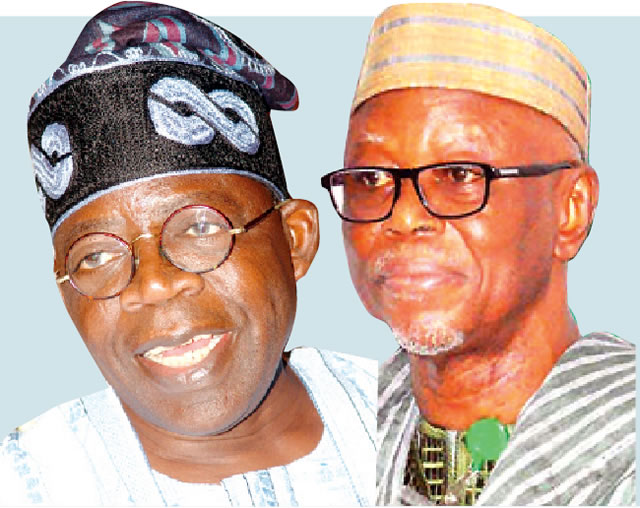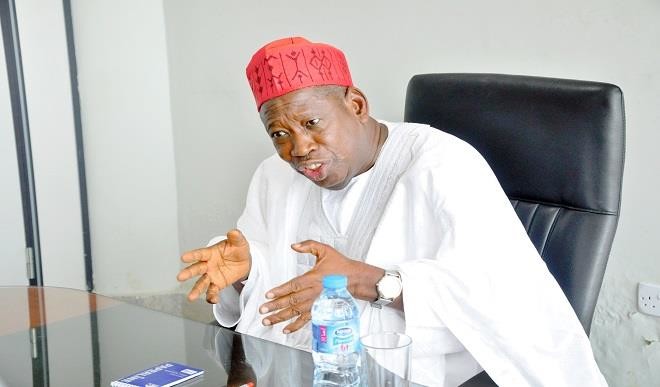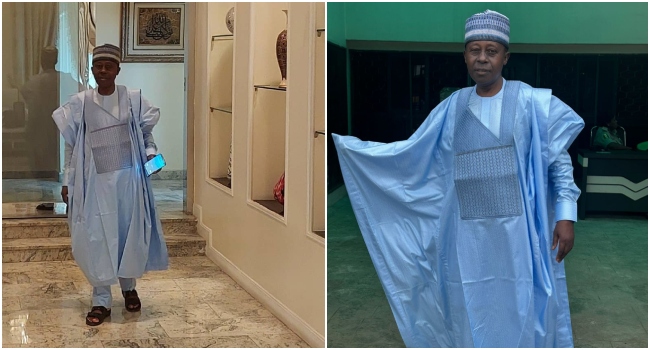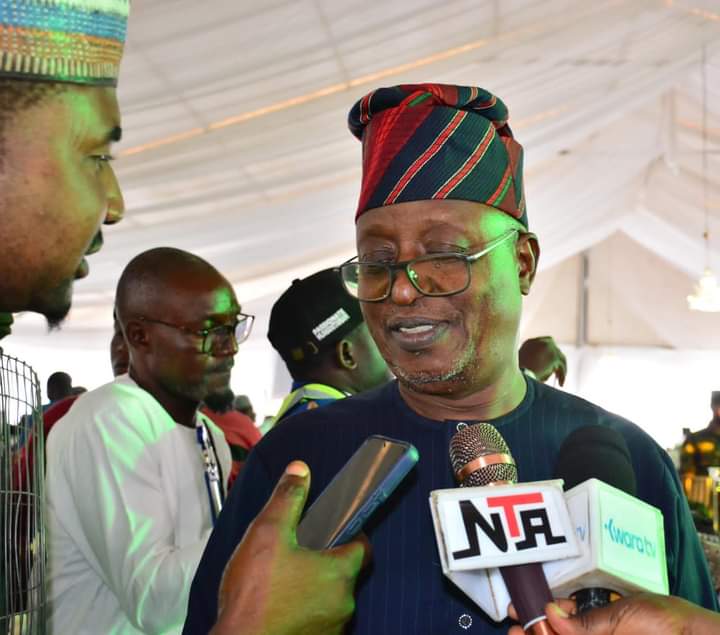- Tinubu Accuses Odigie-Oyegun of Sabotage
A war of attrition seems to be brewing in the All Progressives Congress (APC) as its National Leader, Senator Bola Tinubu, has written a letter to the National Chairman, Chief John Odigie-Oyegun, accusing the national chairman of undermining his efforts at reconciling aggrieved members of the party.
Although Odigie-Oyegun was not available for comments on Thursday, an aide said he was in possession of the letter and would be replying to it at the weekend.
Tinubu’s accusation came just as operatives of the Economic and Financial Crimes Commission (EFCC) on Thursday visited the national secretariat of the ruling APC situated at Wuse 2 area of the Federal Capital Territory, Abuja for an undisclosed enquiry.
President Muhammadu Buhari had earlier in the year appointed Tinubu to reconcile all aggrieved persons within the party, an assignment which he began last month, talking to major stakeholders, including the National Working Committee (NWC).
But Tinubu, in his eight-page letter dated February 21, which was copied to the president, vice-president, Senate president and Speaker of the House of Representatives, accused Odigie-Oyegun of taking actions aimed at sabotaging his presidential assignment.
Specifically, he accused the national chairman of not cooperating with him, saying some of his unilateral actions were capable of worsening the situation in some of the crisis-ridden states.
Saying he approached his assignment with an open mind, Tinubu expressed worry that Odigie-Oyegun’s response was cynical and unhelpful.
According to him, “Upon my appointment, I gave the president my word that I would work diligently and objectively to achieve the goal set before me.
“In this vein, my first port of call after receiving my assignment was our party’s national secretariat to present myself before the NWC with you as one of its members by virtue as the chairman of the party.
“During my interaction, members freely expressed their views concerning the state of the party at the national, state and local government levels.
“On your part, you promised unalloyed support for my mission. Consonant with that vow, you said that you would provide all the information at your disposal and you vowed to act as a liaison between us and the state party chapters.
“Unfortunately the spirit of understanding and of cooperative undertaking to revive the party seemed not to have lived beyond the temporal confines of that meeting. I assure anyone who cares to know that this positive spirit of cooperation did not meet its demise at my hands.”
In the letter entitled: ‘Actions and Conduct Weakening the Party from Within’, the national leader outlined his position on the state of the party and the way forward, saying the solution laid in a balanced appreciation of its daunting challenges.
He said: “My position was and is that we can only restore the party by resolving its current deficiencies in an unbiased, neutral manner that allows us to strengthen our internal democracy by annealing those internal institutions and processes vital to such internal fairness. I stated this position then and I still hold to it with all sincerity.”
But Tinubu suggested that Odigie-Oyegun was not similarly persuaded, contending that the national chairman was apparently incapable of measuring up to his leadership responsibility.
“Those who were entrusted with positions of high responsibility within the party seemed unable to handle the success given them,” he said, adding: “Little attention was tendered to the principles upon which this party was formed and pursuant to which it was presented to the public as an alternative to the cynical politics of the PDP.”
Tinubu pointedly accused Odigie-Oyegun of the undemocratic act of unilaterally meddling in the affairs of some crisis-ridden states, particularly, Kogi, Kaduna and Adamawa States.
He accused the national chairman of rushing to Kogi last weekend to inaugurate a new parallel state executive without reference to the appropriate organ of the party.
Tinubu told Odigie-Oyegun: “It is my understanding that your dissolution of the duly-constituted state executives and the hurried naming of the above-mentioned caretaker group was not approved by the NWC.
“You had let this situation fester for months on end. Only when I was appointed to help resolve internal disputes and when you realised I might focus early on Kogi, did you stir from your indifference and inaction.”
He continued: “Drawing from your behaviour in Kogi, Kaduna and Adamawa with regard to the state chapter assessment requested, I am led to the inference that you have no intention of actually supporting my assignment.
“While this may place you in a significant affinity with those parallel officials you handpicked, this machination suggests no improvement in the welfare of the party in Kogi or at the national level.”
Tinubu said Odigie-Oyegun apparently sought to undermine his mandate by engaging in dilatory tactics for the most of the time, but that when forced to act, the national chairman would do so in an arbitrary and capricious manner.
Reminding the national chairman that the task was a presidential assignment, the national leader directed an immediate release to him the status reports and all the pertinent information regarding the state chapters without further delay.
Efforts to get Odigie-Oyegun’s reaction on Thursday were abortive as he was not available. A source close to him, however, said that he had seen the letter and would respond appropriately by the weekend.
Meanwhile, operatives of the EFCC were at the national secretariat of the party on Thursday.
Investigation revealed that the anti-graft agency’s operatives might have started investigations into an alleged misappropriation of the party’s fund made against the NWC.
Check showed that a group known as Buhari/APC Anti-Corruption Support Group had sent a petition to the anti-corruption agency last week, accusing the national chairman of financial sleaze.
A reliable source said that following the receipt of the group’s petition, EFCC operatives stormed the party’s office at noon Thursday in a black SUV and made straight for the office of the national chairman.
It was learnt that the APC anti-corruption group had organised a protest last week at the EFCC headquarters carrying several placards with the inscriptions: “EFCC Must Probe Oyegun Now!” “Audit APC’s Account Now!’’ and “Oyegun is Killing the Anti-Corruption Policy of Buhari!” The protesters also asked the anti-graft agency to probe the accounts of the ruling party.
The Leader of the group, Mr. Ishola Adeshina, was said to have alleged that the former Edo State governor had been running the accounts of the party without recourse to the majority of national officers of the party.
Last week, the acting Chairman of Cross River State, Mr. Cletus Obun, accused the national leadership of the party of fuelling crisis in the state.
Following some misgivings they had, Obun and some stakeholders of the party from the state on Wednesday rejected a plan by the NWC to hold a special congress to elect a substantive chairman.
Speaking to journalists in Abuja, Obun, who is also the Cross Rivers State vice-chairman from the Central Senatorial District, said the crisis in the state chapter had been allowed to fester because the Odigie-Oyegun failed to stand firm.
In the same vein, the party said that Odigie-Oyegun and the NWC have been given a vote of confidence by the Adamawa State House of Assembly.
In a statement by the party’s spokesman, Malam Bolaji Abdullahi, the party said the state’s legislators, led by their speaker, were at the national secretariat to pass a vote of confidence on the national chairman and the NWC.
It quoted the majority leader of the House as saying: “We have to commend your style of leadership. When the president was inaugurated, he said that we were going to face some challenges, turbulences and encumbrances in the government and the party is not excluded.
“For the past three years, we have seen how you have handled the party right from national to states, local governments and wards. With all these turbulences and encumbrances, we are still the great party that we are.”


 Naira4 weeks ago
Naira4 weeks ago
 News3 weeks ago
News3 weeks ago
 Education4 weeks ago
Education4 weeks ago
 Social Media4 weeks ago
Social Media4 weeks ago
 Economy4 weeks ago
Economy4 weeks ago
 Investment4 weeks ago
Investment4 weeks ago
 Dividends4 weeks ago
Dividends4 weeks ago
 Business3 weeks ago
Business3 weeks ago




























